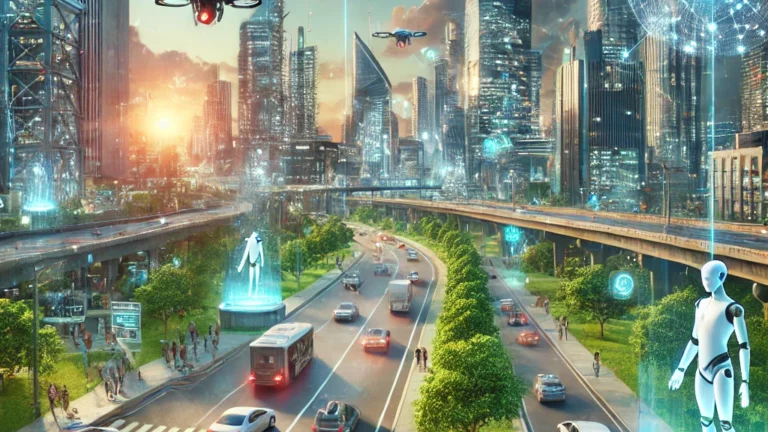Thinking About the Future – What’s Next?
Artificial intelligence (AI) is transforming the world around us in incredible ways, from making everyday tasks easier to revolutionizing entire industries.
Our future is full of even more advanced AI systems that can learn, think, and create just like humans.
This article explores the exciting possibilities of such advanced AI, including Artificial General Intelligence (AGI) and Artificial Superintelligence (ASI), as well as groundbreaking technologies like quantum and neuromorphic computing.
We’ll also delve into the crucial topic of AI safety, ensuring that these powerful systems are developed responsibly and ethically for the benefit of all.
Artificial General Intelligence
Imagine an AI that can understand, learn, and apply its intelligence across a wide range of tasks and activities. How would it learn? Who would teach it? What would they teach it?
As AGI evolves, it will lead to systems that autonomously discover and excel in new fields of knowledge and skill, creating a transformative impact on every industry.
The development of AGI will redefine education, with AI-driven learning systems capable of tailoring knowledge acquisition to each of our needs, learning styles and personal preferences.
As the AI’s ability for autonomous decision-making becomes more sophisticated it will also raise profound questions about who has the ethical oversight and control of these systems.
Artificial Superintelligence
Imagine an AI that surpasses AGI, encompassing not only advanced problem-solving and creative capabilities but also emotional intelligence.
ASI could revolutionize fields such as art, science, and social governance by producing insights and innovations beyond our current comprehension.
It will lead to an era where the boundaries of creativity and understanding are expanded.
Its actions and decisions will profoundly affect us and our society thus needing rigorous frameworks – ethical and legal – to ensure it aligns with our values and ensures our safety.
Quantum Computing
Advances in quantum computing will drastically change how AI is designed and functions.
Computer processing speeds already outstrip the speed at which our brains work.
Quantum computing will match or exceed our brain’s adaptability, learning capability, and efficiency.
As quantum computing matures, it will enable AI systems to solve previously intractable problems, such as perfecting complex supply chains or simulating intricate biological processes.
This will lead to breakthroughs in AI algorithms that are more powerful and efficient, pushing the boundaries of what technology can achieve in solving any challenge.
Biological Integration
The intersection of artificial superintelligence, quantum computing, and biology will likely lead to unprecedented innovations.
Future advancements will result in hybrid systems that merge biological and artificial intelligence, enhancing human cognitive capabilities or creating new forms of biologically integrated AI.
Such developments will revolutionize fields like medicine, with AI-driven biological enhancements offering new treatments or even ways to improve our health and longevity.
This constructive collaboration will prompt deep ethical concerns about the integration of technology within our beings.
Neuromorphic Computing
Neuromorphic Computing models computing on the structure and function of our brains using physical artificial neurons for computation.
As neuromorphic computing technology progresses, it will yield machines that run with unprecedented energy efficiency and flexibility, mimicking our own cognition more closely than traditional computing models do today.
This will lead to AI systems that are better at tasks involving complex sensory processing or autonomous learning.
Neuromorphic computing will enable natural interactions between us and machines, fostering intuitive and effective collaborations.
AI Safety
AI safety is about ensuring that artificial intelligence systems are designed and used in ways that are safe, ethical, and beneficial for everyone.
As AI technology advances, it’s crucial to make sure that these systems act in ways that align with our values and goals.
This means building artificial intelligent systems that don’t make harmful decisions, which respect our privacy, and operate transparently.
It also means predicting potential risks, like job displacement and the misuse of AI.
We will need rules and guidelines to prevent problems before they arise.
Ultimately, AI safety is about making sure that as AI systems become more powerful, they work in ways that our well-being and society as a whole.
In Conclusion
Standing on the brink of this technological revolution, the future of AI holds at the same time incredible promise and profound uncertainty.
While we can envision a world where AI enhances our lives in ways we can only dream of, we must be mindful of the potential risks and challenges that lie ahead.
The path forward is uncharted, and the choices we make today will shape the role AI plays in our future.
It is our responsibility to ensure that these powerful technologies are developed with care, wisdom, and foresight.
As we embrace the unknown, we must remain vigilant and thoughtful, guiding AI’s evolution in a direction that benefits all of humanity for now and forever.
#ArtificialIntelligence #FutureTech #AGI #QuantumComputing #AIethics #TechInnovation #NeuromorphicComputing
About the Author
Stephen Howell is a multifaceted expert with a wealth of experience in technology, business management, and development. He is the innovative mind behind the cutting-edge AI powered Kognetiks Chatbot for WordPress plugin. Utilizing the robust capabilities of OpenAI’s API, this conversational chatbot can dramatically enhance your website’s user engagement. Visit Kognetiks Chatbot for WordPress to explore how to elevate your visitors’ experience, and stay connected with his latest advancements and offerings in the WordPress community.



Leave a Reply
You must be logged in to post a comment.